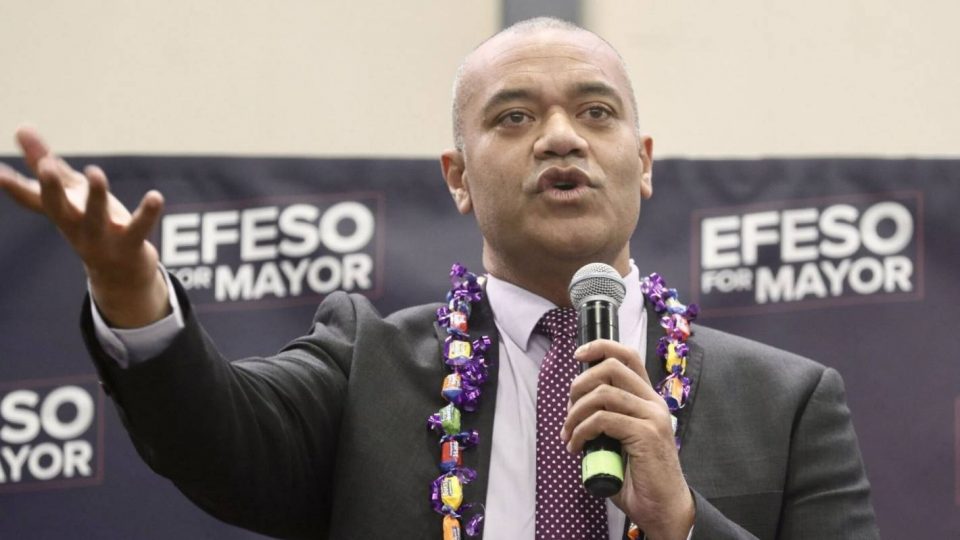ANALYSIS: Efeso Collins is not sure exactly how his flagship policy of fares-free public transport would be paid for, but is confident it can.
It is one of the biggest policy calls in the 2022 Auckland Council election, and possibly the biggest ticket item since Len Brown’s winning 2010 pledge to build the $4.4 billion city rail link, despite government resistance.
When pressed, the Labour and Greens-endorsed candidate points to big lumps of money sitting in the $31 billion Auckland Transport Alignment Project (ATAP) ten-year budget that could be re-directed.
However Collins concedes that he doesn’t know whether the spending those buckets are loosely ear-marked for – such as customer experience – can really be dispensed with.
READ MORE:
* Do Auckland mayoral hopefuls have a plan for young adults?
* Auckland mayoral race a close contest for first time in 12 years, strategist says
* Auckland mayoralty: Wayne Brown’s ‘fixes’ put under the microscope
“What needs to happen is when we take office, sit down with the transport planners and the budgeting people, and follow their advice,” he said.
“Work out what (projects) might be delayed, and what don’t need to go ahead,” said Collins.
Scrapping fares, he estimated, would cost $236 million a year to start with. The real cost is hard to pin down because it requires knowing how many people would normally have travelled and paid, and patronage is still 30 per cent below pre-Covid-19 levels and struggling.
One Auckland Transport-sourced estimate priced it at $500 million annually by 2030, but for a city separately needing a nine-fold increase in public transport use by that year, any kind of forecasting is very uncertain.
Chris McKeen/Stuff
Efeso Collins during his campaign launch in Otara, south Auckland. (File photo)
Collins acknowledged something would have to give, the fund the policy.
“It’s about acknowledging that in any budget discussion there are trade-offs,” he said.
Fares-free is a policy, a bit like City Rail Link, the twin rail tunnels which will create a loop around the centre city, that requires a leap of faith with no spreadsheet that can guarantee a return on health, equity, congestion of climate grounds.
The risk of selling that to 1.2 million Auckland voters is Collins’ and if elected he can claim a mandate to explore the detail.
He is not keen on progressively removing fares, for example starting with students, and/or low-income people. Community Service Card holders were already set to travel for half-price from mid 2022, before the government’s blanket half-price scheme was introduced, running until January 31, 2023.
Todd Niall/Stuff
Auckland mayoral candidate Efeso Collins campaigning at the Avondale markets.
His opponents criticise the plan for its cost, and say foregone revenue could be better used to improve services and attract patronage by making public transport a more attractive travel option.
Collins has taken a political risk, in the Len Brown mould, spearheading his campaign with one big policy, supported by aspiration to make the city fairer and more affordable for the less-well-off and young.
There are other policies that signal a style rather than committing large sums of money, even the setting up of a council-government liaison office in Wellington, Collins doesn’t see as costly.
In a so-far polite and non-confrontational race, Collins – a two term Manukau ward councillor who has not held committee chair roles – has had few serious questions lobbed at him from rivals.
Collins briefly was portrayed as a high-rates candidate, helped by his use of a confusing description of rates being “affordable” if not more than 5% of household income, but reverted to advocating the 3.5% increase pencilled in for next year, but possibly at risk from budget pressures.
Past opposition to social issues such as gay marriage Collins has openly addressed as ideals that reflected the strong role of his church upbringing in the past, views which he has since moved on from.
Chris McKeen/Stuff
Efeso Collins’ mayoral campaign hoardings in Ponsonby. (File photo)
Collins’ biggest challenge may be to ensure that his core constituency does get out and vote, in a city with declining council election participation that hit just 35% in 2019.
His Otara heartland had the lowest participation at just 23%, and October 8 will show how effectively Collins has campaigned in less left-leaning communities, such as the eastern suburbs and the north.
Collins’ advertising appears to have moved to tackle issues his rivals make much of, with his latest newspaper ad advocating: “Take Back Control of Auckland Transport” by restoring two councillors to its board of directors.
Councillor directors were in place under Len Brown, but scrapped by Phil Goff, and exactly what they would achieve, other than an appearance of more political “control” of the agency is not clear.
Ricky Wilson/Stuff
Candidates Wayne Brown, Efeso Collins and Craig Lord at the Stuff AUT mayoral debate.
Slightly tongue-in-cheek, one rival camp had been told that when running for president of the Auckland University Students’ Association, Efeso has promised an ice cream kiosk in the student quad, and not delivered.
“I genuinely can’t remember,” said Collins of his student campaign a quarter of a century ago, but noted you could now get good ice cream on that part of the campus.


